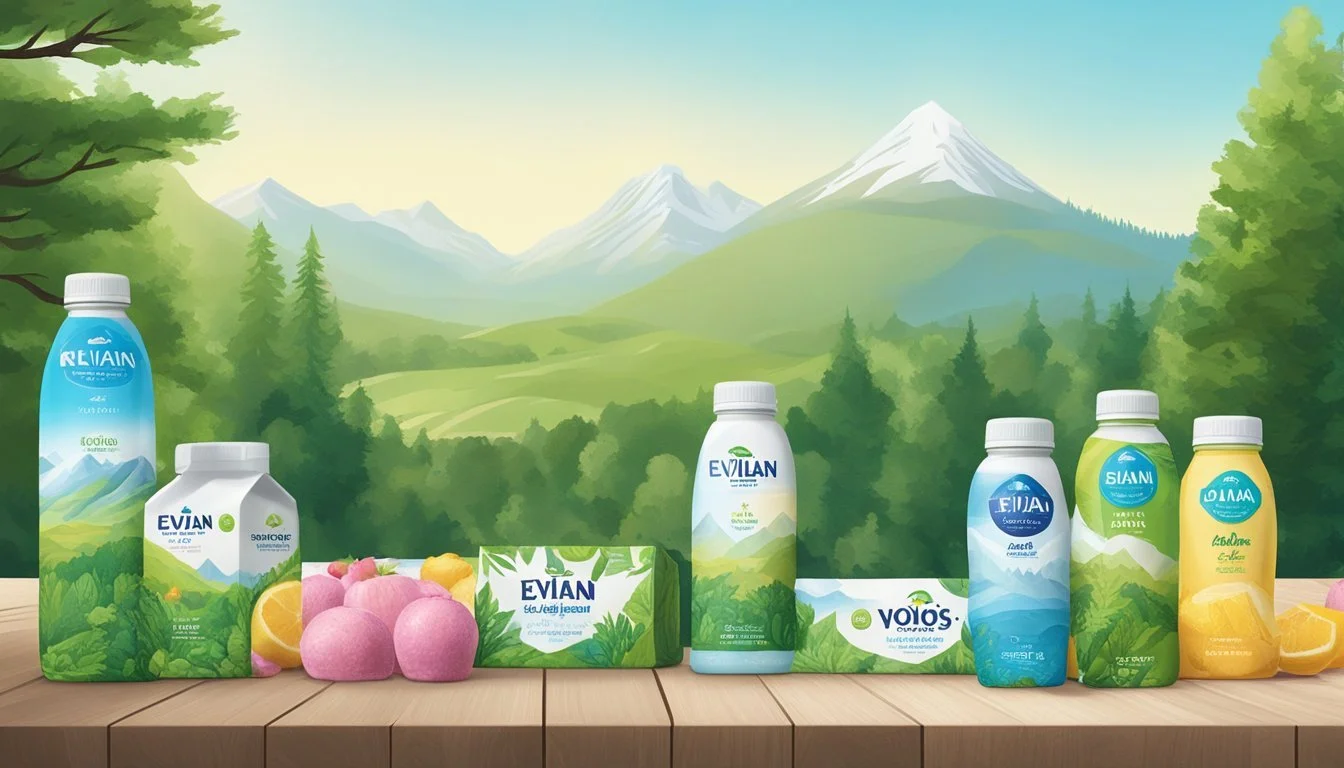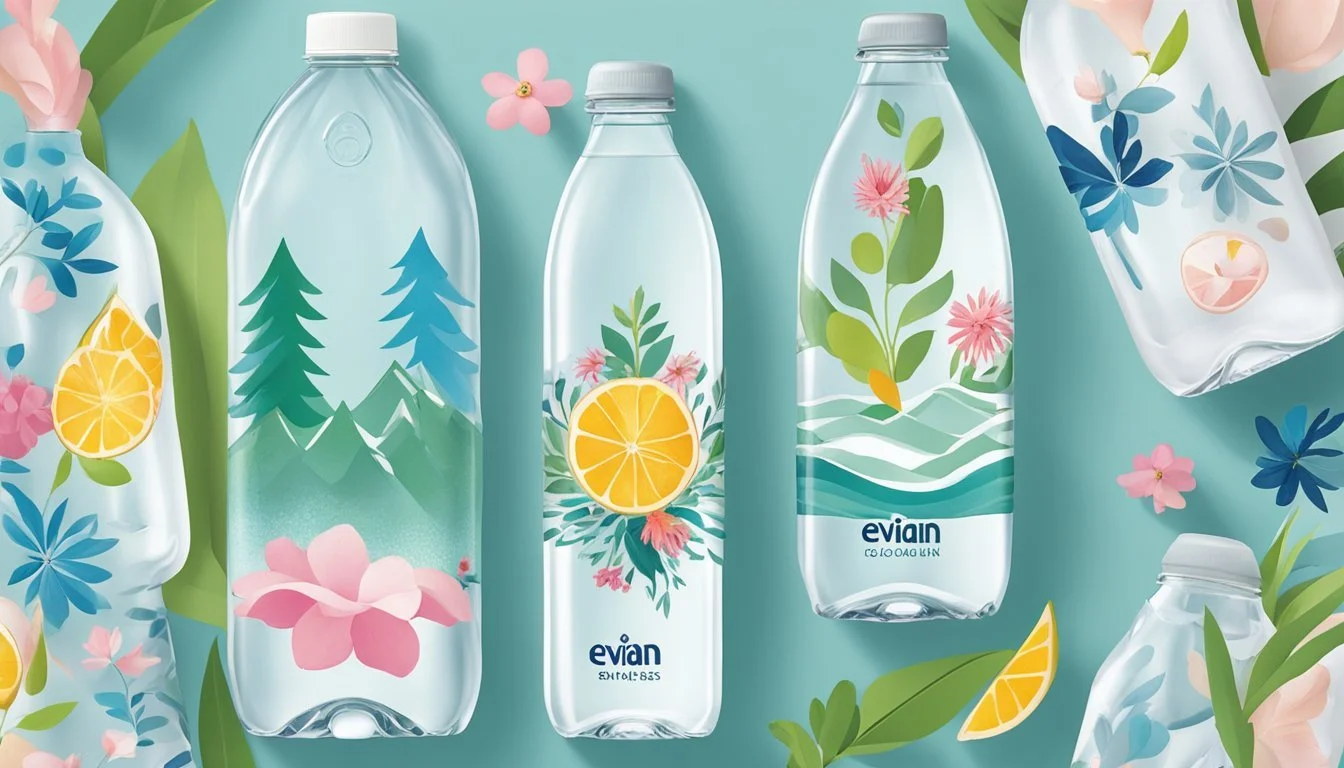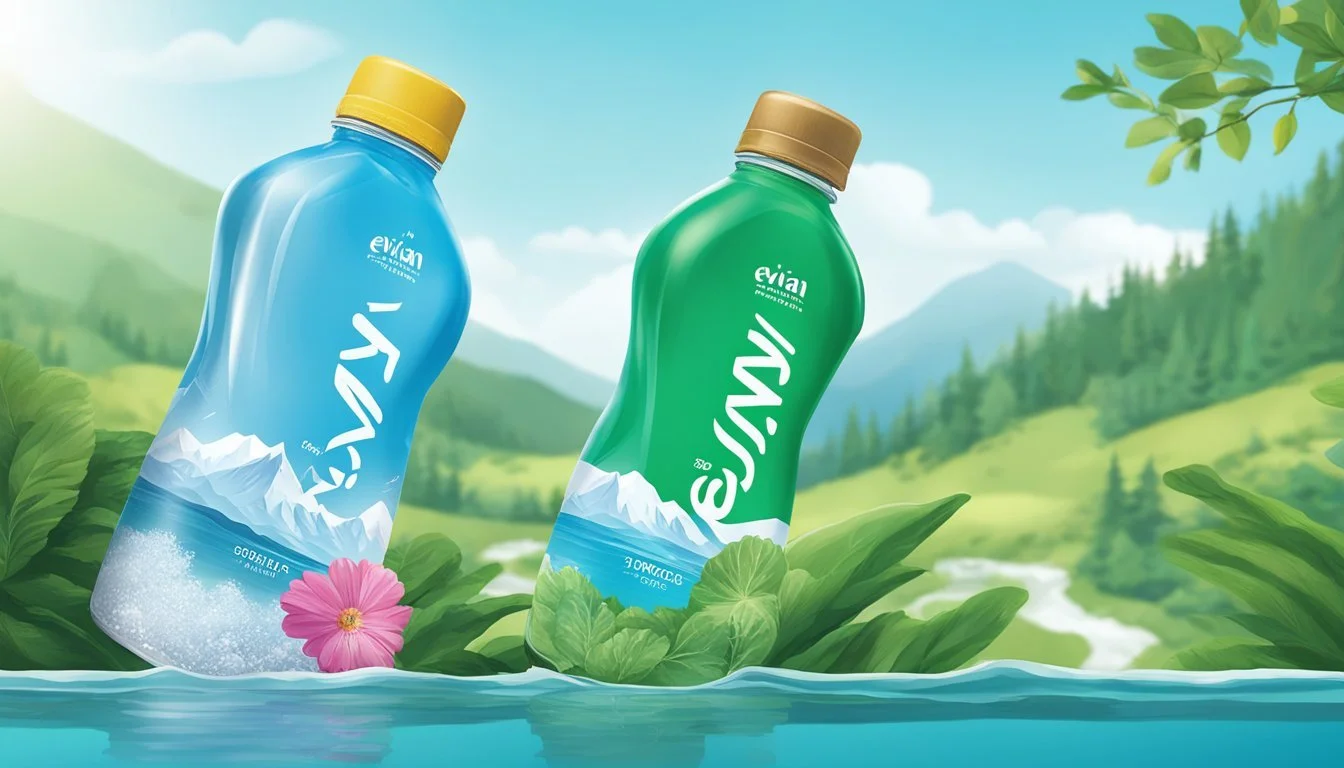Evian vs. Whole Foods 365
Comparing Quality, Taste, and Value
When it comes to choosing between Evian and Whole Foods 365 bottled water, consumers often find themselves weighing the qualities of premium pricing against accessibility and cost-effectiveness. Evian, known for its crisp taste and high mineral content sourced from the French Alps, stands out as a luxurious choice in the bottled water market. Whole Foods 365, on the other hand, offers a more budget-friendly option without significant compromises on purity or taste.
Evian boasts a clean, refreshing profile, attributed to its natural filtration process through glacial sands, which enriches it with minerals like calcium and magnesium. Its commitment to sustainability, including bottles made from 100% recycled plastic, appeals to environmentally conscious buyers. Whole Foods 365 spring water provides a more straightforward hydration solution, liked by many for its smooth taste and affordability, making it a go-to for daily consumption.
For those prioritizing a premium experience and higher mineral content, Evian remains the clear favorite. Whole Foods 365 appeals to practical shoppers looking for a reliable and economical alternative without notable aftertastes and environmental concerns. Whether you prefer the refined profile of Evian or the dependable appeal of Whole Foods 365, both brands offer distinct advantages suited to different preferences and needs.
Overview of Bottled Water
Bottled water has become a staple in many households, marketed as a convenient and often healthier alternative to tap water. The following sections provide an in-depth look into its history, types, and regulations.
History and Growth of Bottled Waters
The commercialization of bottled water began in the mid-19th century with companies like Apollinaris starting operations. However, it wasn't until the late 20th century that bottled water saw significant growth.
This surge was driven by increasing health consciousness, and the perception of bottled water as a pure, safe alternative to tap water. Advertising and branding by companies like Evian and Perrier also played critical roles in boosting its popularity.
With global sales reaching billions of liters annually, bottled water has now become one of the largest segments in the beverage industry, supported by extensive marketing and retail networks.
Different Types of Bottled Water
There are several distinct types of bottled water, each with specific characteristics:
Spring Water: Sourced from underground formations where water flows to the surface, often perceived as natural and pure.
Purified Water: Typically derived from municipal sources but goes through purification processes such as reverse osmosis.
Mineral Water: Contains minerals and trace elements naturally present in the source.
Alkaline Water: Enhanced with additional minerals to raise its pH level, marketed for its potential health benefits.
Brands like Whole Foods' 365 offer various kinds including spring, purified, and alkaline options, catering to diverse consumer preferences.
Bottled Water Standards and Regulations
Bottled water in the United States is regulated primarily by the Food and Drug Administration (FDA). The FDA establishes standards for contaminants, labeling, and manufacturing practices.
The Environmental Protection Agency (EPA) oversees public drinking water standards, which indirectly influence bottled water regulations. Additionally, industry groups like the International Bottled Water Association (IBWA) set quality benchmarks and conduct audits to ensure compliance.
Companies must adhere to stringent guidelines to ensure safety and quality, including regular testing and reporting. These regulations help maintain consumer trust in bottled water products available on the market.
Evian Water Analysis
Evian water stands out for its unique sourcing, beneficial mineral content, and distinct taste.
Sourcing from the French Alps
Evian sources its natural spring water from the pristine French Alps. This region is renowned for its high-quality, untouched springs. The water's journey begins as rain and snow, filtering through mineral-rich glacial sands for over 15 years. This extensive natural filtration process ensures purity and imparts a balanced mineral composition. The sustainable practices at Evian’s bottling site preserve the ecosystem, maintaining the water's cleanliness and natural properties without any artificial enhancements.
Mineral Content and Health Benefits
Evian water's mineral content includes essential minerals like calcium, magnesium, and bicarbonates. These minerals contribute to various health benefits. Calcium supports bone health, while magnesium aids in muscle function and hydration.
The average composition per liter is:
Calcium: 80 mg
Magnesium: 26 mg
Sodium: 6.5 mg
This balanced mineral profile makes Evian a viable option for individuals seeking a nutritious hydration source. The low sodium content is particularly beneficial for those monitoring their salt intake. Evian's natural minerals are absorbed better by the body compared to synthetic supplements, enhancing overall well-being.
Taste Profile of Evian
Evian water is often described as having a smooth and neutral taste, which can be attributed to its balanced mineral content. The presence of bicarbonates gives it a subtle alkaline flavor with a pH level of around 7.2. This slightly alkaline nature offers a clean, crisp taste without any metallic or bitter aftertaste.
Many consumers appreciate this mild flavor, as it is neither too strong nor too bland. The unique taste profile of Evian makes it a preferred choice for those who enjoy a refreshing and pure drinking experience.
In summation, Evian's sourcing, mineral content, and taste make it a standout choice among bottled waters.
Whole Foods 365 Water Analysis
Whole Foods 365 Spring Water positions itself as a budget-friendly option with varying sources and purification processes. This section dives into the sources, mineral content, and overall drinkability of Whole Foods 365 water.
Sources and Purification Process
Whole Foods 365 sources its water from natural springs across various locations. The brand ensures that water bottling adheres to strict standards to maintain purity.
Using reverse osmosis, impurities are removed, ensuring safer and cleaner water. During this process, unwanted substances like heavy metals and chemicals are filtered out, making the water more suitable for consumption.
Additionally, bottling facilities are regularly inspected to meet both state and federal regulations.
Comparing Mineral Content
Examining mineral content is crucial to understanding Whole Foods 365 Spring Water's health benefits. The water is naturally rich in essential minerals like calcium, magnesium, and potassium.
These minerals contribute to better hydration, improved bone health, and overall wellness. Here's a brief look at specific mineral levels per liter:
Mineral Amount (mg) Calcium 20 Magnesium 10 Potassium 1
However, the mineral content can vary slightly depending on the natural spring source.
Flavor and Drinkability
Flavor and drinkability often determine consumer preference. Whole Foods 365 Spring Water has a neutral flavor profile, making it suitable for everyday drinking.
Some taste testers have noted a slight dry aftertaste, which is characteristic of spring water with a balanced mineral content. At a competitive price point, it offers a satisfying alternative to more expensive brands.
The flavor remains consistent, whether consumed straight from the bottle or used in cooking and other beverages.
Health and Hydration
Evian and Whole Foods 365 offer distinct choices for health-conscious individuals. Both are beneficial for hydration, yet they differ in mineral content and potential health benefits.
The Role of Electrolytes in Hydration
Electrolytes such as calcium, magnesium, and potassium are essential for maintaining proper hydration. Evian water contains beneficial electrolytes and minerals. Calcium aids in bone health, magnesium supports muscle function, and potassium is crucial for nerve transmission. This makes Evian particularly beneficial for athletes and those with active lifestyles.
Whole Foods 365, in contrast, is noted more for being a reliable, average spring water with less emphasis on specific electrolytes. While it provides basic hydration, it may lack the supplementary minerals found in Evian that contribute to better overall health and recovery after exercise.
Water Intake and Health Implications
Regular water intake is vital for various bodily functions. Proper hydration can help prevent kidney stones, a common issue among those with low fluid intake. Evian's slightly alkaline pH level (around 7.2) can be beneficial for people looking to maintain a balanced body pH and possibly reduce acidity.
Whole Foods 365 water, while effective for general hydration, doesn't boast the same mineral composition as Evian. Its simpler profile may serve those who prefer a no-frills approach to hydration. Nevertheless, sufficient intake of either can aid in maintaining overall health and well-being, particularly during physical activities.
Quality and Safety Considerations
When comparing bottled water brands like Evian and Whole Foods 365, evaluating quality and safety is crucial. Key factors include the presence of contaminants like PFAS and heavy metals, and understanding regulations around permissible limits.
Assessing the Presence of Contaminants
Both Evian and Whole Foods 365 undergo rigorous testing to ensure product purity. However, recent reports by Consumer Reports highlighted the presence of toxic PFAS chemicals in various bottled waters, including popular brands.
PFAS, or per- and polyfluoroalkyl substances, were discovered in several carbonated and noncarbonated bottles. These chemicals are scrutinized due to their potential health risks.
Lead, arsenic, and other heavy metals are additional concerns. Although typically found within legal limits, their presence is carefully monitored. The precise contamination levels in Evian and Whole Foods 365 have not been explicitly stated, but consumers are encouraged to check each brand's quality report for specifics.
Understanding PFAS and Heavy Metals
PFAS are persistent synthetic chemicals found in many products, including bottled water. Their levels are measured in parts per trillion (ppt). Even low levels can be harmful over time. Regulations aim to keep these levels minimal, although some brands may still contain measurable amounts.
Heavy metals such as lead, cadmium, mercury, and arsenic can also pose risks. These metals are regulated with strict limits to minimize health hazards. Understanding these regulations and the testing results of each brand is key for consumers.
Evian and Whole Foods 365 must adhere to these stringent guidelines. Consumers should look for detailed reports from trustworthy sources to ensure their chosen water brand meets safety standards.
Environmental and Sustainability Perspectives
Both Evian and Whole Foods 365 bottled water brands aim to balance quality and environmental responsibility. The following details their impact on the environment and their specific sustainability initiatives.
The Environmental Impact of Bottled Water
Bottled water production significantly affects the environment. Plastic used in bottles contributes to pollution and non-recyclable waste.
Evian, sourced from the French Alps, is renowned for its pristine, natural water but its plastic packaging leaves a notable environmental footprint.
Whole Foods 365, categorized as spring water, also uses plastic bottles. Comparatively, the environmental costs of both brands show the pressing need for effective waste management practices in the industry.
Sustainability Initiatives by Bottled Water Brands
Evian has adopted several measures to mitigate its environmental impact.
They commit to making their plastic bottles 100% recyclable and aim to use recycled plastic for all their packaging by 2025. Their water source management in the French Alps ensures continued purity and natural filtration.
Whole Foods 365 participates in similar sustainability efforts. The brand emphasizes recyclable packaging, although specific details on their overall environmental initiatives are less prominently reported compared to Evian. Efforts to remain environmentally friendly are evident through their use of spring water and recyclable materials.
Consumer Insights
Both Evian and Whole Foods 365 bottled waters have distinct consumer markets. Preferences for taste, quality, and source significantly drive water drinkers' choices.
Understanding Water Drinkers’ Preferences
Water drinkers prioritize taste, purity, and brand reputation. Evian, sourced from the French Alps, is often perceived as more premium. It boasts a distinct minerality and natural taste, appealing to those who seek an upscale hydration experience.
On the other hand, Whole Foods 365 offers an affordable and reliable choice. It's appreciated for its accessibility but has mixed reviews regarding taste, described as having a sour or dry aftertaste. Price and convenience are its main attractions.
Role of Water Sommeliers in Curating Water Experiences
Water sommeliers are experts in water tastes and characteristics. They play a crucial role in educating consumers about the nuances of different waters. Martin Riese, a renowned water sommelier, highlights that factors like mineral content and source influence water taste significantly.
For Evian, sommeliers often point out its balanced mineral content and smooth finish. For Whole Foods 365, sommeliers emphasize its value proposition, but some note that it lacks the distinctive qualities of premium brands.
These experts help consumers navigate choices, ensuring a fulfilling hydration experience tailored to individual preferences.
Comparative Taste Test
A thorough comparison of Evian and Whole Foods 365 bottled waters reveals distinct differences in their flavor profiles. Below is a detailed examination of our findings from a blind taste test.
Setting Up a Blind Taste Test
A blind taste test ensured unbiased evaluations of Evian and Whole Foods 365. Participants were unaware of which brand they were sampling.
Materials:
Two identical, unmarked cups for each tester
Chilled bottles of Evian and Whole Foods 365
Clean water for palate cleansing
Participants sipped both waters and noted initial and lingering tastes. Assessments were collected, focusing on texture, aftertaste, and overall taste perception.
Analyzing the Flavor Profiles
Evian, sourced from the French Alps, is famous for its soft, mineral-rich taste. Key characteristics:
Smooth and velvety texture
Subtle sweetness with no dominating mineral flavor
Whole Foods 365, labeled as spring water, presents a different taste:
Slightly sour, with a dry aftertaste
Less mineral presence compared to Evian
Participants often preferred Evian for its mild and refreshing profile. Whole Foods 365 water was described as average in comparison.
Final Considerations and Recommendations
When considering bottled water options, it's important to compare factors like taste, pH level, and safety. Here’s how Evian and Whole Foods 365 compare.
The Verdict: Evian vs Whole Foods 365
Taste and Quality
Evian is known for its unique taste, contributed by its mineral content. It has a balanced mouthfeel and a slightly alkaline pH of 7.07. This makes it appealing for those who prefer a smoother, more neutral taste. Whole Foods 365, on the other hand, has been noted for its sour taste and dry aftertaste, which may not be as appealing to some.
Health Considerations
Evian's slightly alkaline pH may be beneficial for balancing body acidity. Whole Foods 365 has a more acidic profile, which could impact the taste and may not be suitable for those preferring less acidity in their water.
Safety and Contaminants
Consumer Reports has raised concerns about PFAS chemicals in various bottled waters. It’s crucial to check the latest reports or tests concerning these contaminants. While both brands aim to provide safe drinking water, ongoing scrutiny ensures they meet safety standards.
Environmental Impact
Both brands offer eco-friendly initiatives. Evian is committed to sustainability, using recyclable materials and aiming for carbon neutrality. Whole Foods 365 also emphasizes sustainable practices. Choosing either brand depends on personal preference and alignment with these initiatives.
In making a choice, consider taste, pH level, safety, and environmental efforts. This will help determine the best bottled water for your needs.
More About Evian
Evian vs Mountain Valley Spring Water: Which Bottled Water is Better?
Evian vs Richard's Rainwater: Which Bottled Water is Better?
Evian vs Whole Foods Italian Still Mineral water: Which Bottled Water is Better?
More About Whole Foods 365
Acqua Pana vs Whole Foods 365: Which Bottled Water is Better?
Alkaline88 vs Whole Foods 365: Which Bottled Water is Better?
Antipodes vs Whole Foods 365: Which Bottled Water is Better?
Aqua Carpatica vs Whole Foods 365: Which Bottled Water is Better?
Arrowhead vs Whole Foods 365: Which Bottled Water is Better?
Big Chill vs Whole Foods 365: Which Bottled Water is Better?
Boxed Water vs Whole Foods 365: Which Bottled Water is Better?
Cascade Mountain vs Whole Foods 365: Which Bottled Water is Better?
Castle Rock vs Whole Foods 365: Which Bottled Water is Better?
Core Hydration vs Whole Foods 365: Which Bottled Water is Better?
Crystal Geyser vs Whole Foods 365: Which Bottled Water is Better?
Deer Park vs Whole Foods 365: Which Bottled Water is Better?
Hawaii Volcanic vs Whole Foods 365: Which Bottled Water is Better?
Hawaiian Springs vs Whole Foods 365: Which Bottled Water is Better?
Ice Mountain vs Whole Foods 365: Which Bottled Water is Better?
Icelandic Glacial vs Whole Foods 365: Which Bottled Water is Better?
Just Water vs Whole Foods 365: Which Bottled Water is Better?
Liquid Death vs Whole Foods 365: Which Bottled Water is Better?
Mountain Valley Spring Water vs Whole Foods 365: Which Bottled Water is Better?
Nestle Pure Life vs Whole Foods 365: Which Bottled Water is Better?
Open Water vs Whole Foods 365: Which Bottled Water is Better?
Poland Spring vs Whole Foods 365: Which Bottled Water is Better?
Pure Life vs Whole Foods 365: Which Bottled Water is Better?
Purely Sedona vs Whole Foods 365: Which Bottled Water is Better?
Richard's Rainwater vs Whole Foods 365: Which Bottled Water is Better?
San Pellegrino vs Whole Foods 365: Which Bottled Water is Better?
Simple Truth vs Whole Foods 365: Which Bottled Water is Better?
Smartwater vs Whole Foods 365: Which Bottled Water is Better?
Solan de Cabras vs Whole Foods 365: Which Bottled Water is Better?
Talking Rain AQA vs Whole Foods 365: Which Bottled Water is Better?
Topo Chico vs Whole Foods 365: Which Bottled Water is Better?
Weird Water vs Whole Foods 365: Which Bottled Water is Better?
Whole Foods 365 vs 1907water: Which Bottled Water is Better?
Whole Foods 365 vs BodyArmor: Which Bottled Water is Better?
Whole Foods 365 vs CBD Living: Which Bottled Water is Better?
Whole Foods 365 vs Crystal Lake: Which Bottled Water is Better?
Whole Foods 365 vs Essence pH10: Which Bottled Water is Better?
Whole Foods 365 vs Kirkland Signature: Which Bottled Water is Better?
Whole Foods 365 vs Proud Source: Which Bottled Water is Better?
Whole Foods Italian Still Mineral water vs Whole Foods 365: Which Bottled Water is Better?
Zephyrhills vs Whole Foods 365: Which Bottled Water is Better?






